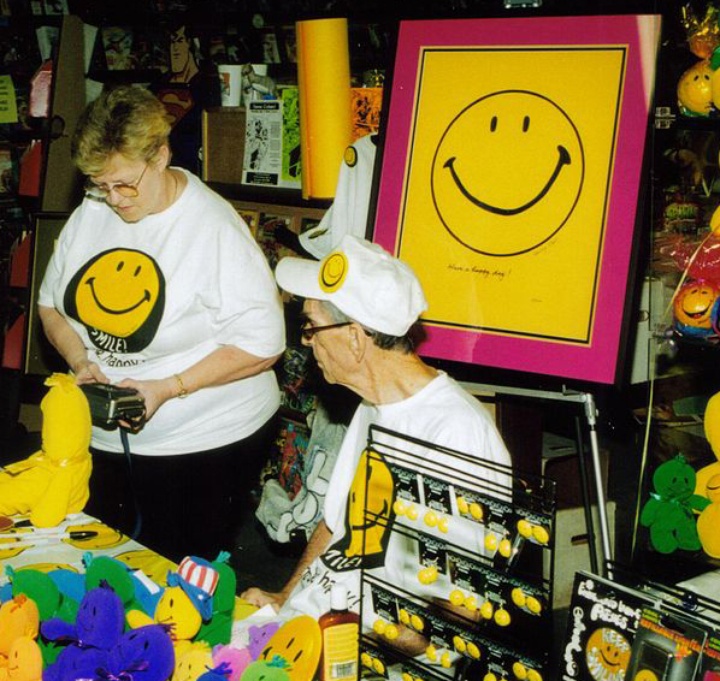One
of this world’s dominant characteristics, and certainly its
greatest flaw, is its optimism.
(Alain
de Botton)
###

Purveyor of unhappiness: Harvey Ball was paid $45 in 1963 to create the “SmileyFace” icon for an insurance company. Here he is at a 35th anniversary event honoring his international “happy” icon. (“Thatse,” Wikipedia Commons)
Coming from the UK, where one’s public face entails caution about showing any sign of happiness or optimism, I’m well versed in the advantages of pessimism. Ask a Brit how they’re doing on the very best day of their lives—they got the promotion, they won the lottery, their love has finally been requited—and they’re likely to respond with a frowning, “Not too bad, can’t complain, could be worse.” (I found the polar opposite when we lived in Silicon Valley—even though one’s spouse had died the previous day—anything less than “Great! Couldn’t be better!” was seen as a threat to the System.)
The beauty of having a pessimistic view of life, of course, is that it maximizes opportunities for happy surprises. Instead of the optimist’s “Boy, didn’t see that one coming,” the pessimist can be reassured that he or she really did see that one coming (“See? I told you to be careful crossing the road!”) and, on the off-chance something good happens, they get this delightful surprise: “Wow! Must be my lucky day!”
Having the pursuit of happiness enshrined by the founding fathers into our day-to-day lives only increases life’s already onerous burdens. “Oh man, I’ve got to finish school, get a job, find a life partner, buy a house, open a 401K … and pursue happiness!” No wonder we — on average — don’t get enough sleep, eat too much, worry about our kids and covet the latest iPhone. It’s the pressure, man.
Me, I blame Christianity. Talk about offering hope! The magic word is “salvation” of course. Embrace Jesus and you get saved, such a deal. What Americans (I use the term lightly, I mean the land between the Rio Grande and the 49th parallel, plus a couple of outliers) may have forgotten—I say this in full awareness of my alien birth—is that you don’t get saved until you die. Seems to me that those of us living here who weren’t born in Blightly (or Canada or Kenya or in other benighted parts of the world) expect the salvation to be here and now.
Christianity and smartphones. Smartphones and all they represent — life getting better, faster, glitzier — promise improvement. But we’re as subject to the same heartaches and disappointments as our parents were. The same accidents, jealousy, frustration, anxiety that shadowed their lives hangs over ours. (Except, for most of them, they were better off financially than their parents — that particular measure of “improvement” is fast disappearing.)
And lest you think the ultimate entree into chronic happiness is state-sanctioned cohabitation, I’ll offer another thought from architect-author Alain de Botton: “The benefits of a philosophy of neo-religious pessimism are nowhere more apparent than in relation to marriage, one of modern society’s most grief-stricken arrangements, which has been rendered unnecessarily hellish by the astonishing secular supposition that it should be entered into principally for the sake of happiness.”
Next time you’re advised, “Don’t worry, be happy,” you may want to consider the burden you’d be adopting. My advice, for what it’s worth: Go ahead and worry. You’ll be happier for it.
CLICK TO MANAGE